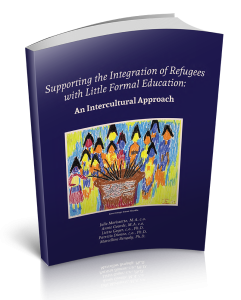|
Getting your Trinity Audio player ready...
|
For many refugees arriving in Canada, adapting to a new country comes with significant challenges. However, those with low levels of formal education face even greater barriers to integration. Career development and guidance professionals play a crucial role in supporting these individuals as they navigate employment, education and community engagement. The guide, Supporting the Integration of Refugees with Low Levels of Education: A Cross-Cultural Perspective on Counselling, provides evidence-based strategies to enhance career and employment support for this population.
Understanding the unique challenges faced by refugees with low levels of education

- Limited language proficiency: A lack of fluency in English or French creates barriers to employment, education and social integration.
- Recognition of prior experience: Many arrive with rich work and life experiences, yet struggle to have their skills acknowledged in the labour market.
- Economic and social vulnerability: Refugees with lower levels of education often take on precarious, low-wage jobs with little opportunity for advancement.
- Complex mental health impacts: Migration trauma, loss of status and daily struggles in a new country can contribute to significant psychological distress.
Strategies for career and employment practitioners
The guide provides practical recommendations to help career and employment practitioners better support refugees with low levels of education. It emphasizes the importance of adopting an intercultural and reflective approach when working with this group. Key strategies include:
- Using strengths-based approaches: Rather than focusing on what refugees lack, practitioners can highlight transferable skills and lived experiences to foster confidence and career development.
- Developing tailored learning opportunities: Flexible, accessible training programs that incorporate hands-on learning and language support can be highly effective.
- Building partnerships with employers: Advocacy and employer engagement can help create inclusive hiring practices and work environments that recognize diverse skillsets.
- Fostering community connections: Social networks and mentorship programs can play a significant role in helping refugees navigate employment pathways and personal development.
A practical resource for the field
Developed by researchers at Université Laval and Université de Sherbrooke in partnership with CERIC, this guide provides a research-backed framework for professionals supporting refugee integration. It combines theoretical insights with actionable tools that can be applied in career counselling, employment services and education settings.
Available for free on the CERIC website and in print through Amazon, this resource is an essential tool for career and employment professionals looking to enhance their practice and create meaningful opportunities for refugees.
Moving forward: Strengthening intercultural competencies
As Canada continues to welcome refugees, career development and employment professionals must be equipped with the right tools to foster meaningful integration. By developing culturally responsive practices, advocating for systemic change and applying the strategies outlined in this guide, practitioners can help refugees with low levels of education build sustainable careers and fulfilling lives in Canada.
For those working in the field, this guide offers an invaluable foundation to improve services and make a lasting impact on the lives of refugees and their families. Download your free copy today and explore how you can implement these strategies in your practice.




